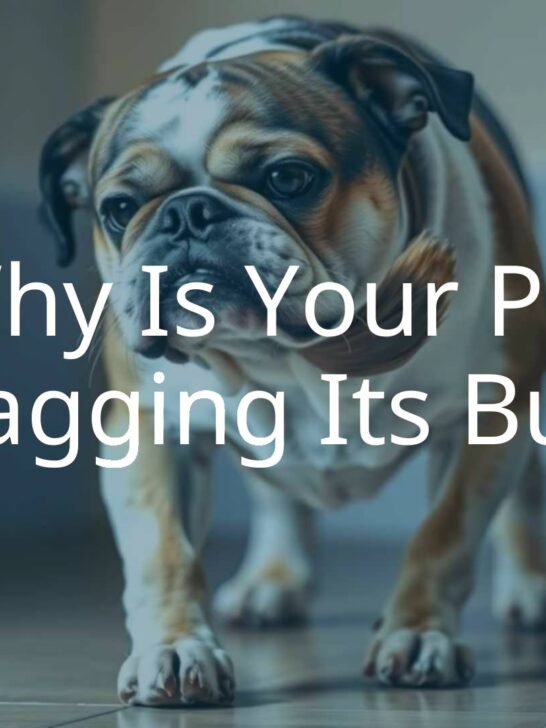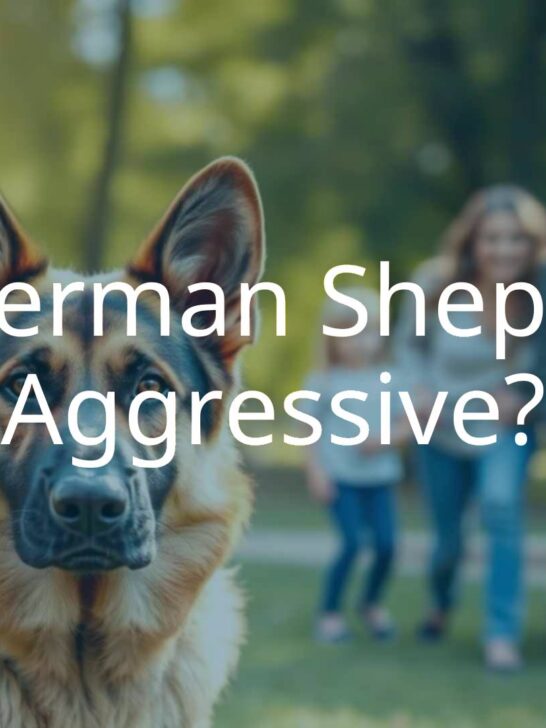Are German Shepherds Aggressive? Managing Aggression in GSDs
Don’t get us wrong: German Shepherds make great dogs. They’re protective, intelligent, and eager to please.
Well-behaved German Shepherds are among the most loyal, active dogs and they fit in well with many families – unfortunately, not all German Shepherds share these tendencies.
Are all German Shepherds naturally aggressive?
Unfortunately, it’s not uncommon to adopt or meet an aggressive German Shepherd since they were originally bred to be powerful and alert guard dogs, not companions.
While a well-adjusted German Shepherd makes a great friend to have by your side, an aggressive one can be challenging to live with.
If you adopted an aggressive German Shepherd, you may wonder why they act the way they do. We don’t blame you – it’s important to know the root cause of their behavior.
Fortunately, German Shepherds are intelligent dogs. Even when they’re aggressive, they’re easier to train than many other breeds.
With the right training methods and persistence, you can teach your German Shepherd better behaviors and manage its aggression.
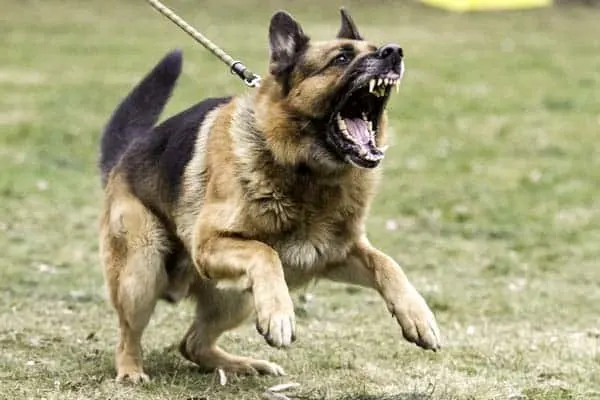
Why Are German Shepherds Aggressive?
German Shepherds may be aggressive for many reasons. There’s no one-size-fits-all answer, it depends on the dog, their upbringing, age, and training history.
There’s often a lifestyle factor that triggers aggressive behavior in German Shepherds. But, when properly addressed, these aggressive actions can be reduced and even eliminated entirely.
Let’s take a look at why your German Shepherd may be aggressive and what you can do to fix it.
Your Dog Isn’t Getting Enough Exercise
German Shepherds need a lot of exercises – more than 2 hours per day ideally.
If your dog isn’t getting an adequate amount of exercise – be it walking, running, or playing – he may use other behaviors to expend his energy.
Before you adopt a German Shepherd, remember they’re one of the most active breeds – they need more exercise than other dogs because of their natural physical condition.
Similar to human kids, dogs may feel ‘cooped up’ or confined if they don’t get enough exercise. It can impact their attention span, cause mood swings, and make them restless.
A restless German Shepherd is far more likely to be aggressive than one that regularly enjoys plenty of exercise and playtime.
Fortunately, this is one of the easiest causes of aggression to address – it’s as easy as walking your dog more!
This is great for both the GSD and the owner as this not only gets them both exercising but helps strengthen their relationship as well.
If you don’t have the time to give your dog at least 2 hours of exercise, consider hiring a dog walker.
There are many services on the internet (like Wag! and Rover) that make hiring walkers easy and affordable.
Remember – walking your German Shepherd is non-negotiable. If you plan on adopting this type of active dog, it’s your responsibility to help him get the exercise he needs.
Your Dog is Bored
Like human children, dogs may ‘act out of line’ if they’re bored or aren’t getting enough attention. Depending on the individual, this may include aggressive behaviors.
German Shepherds are remarkably loving, loyal dogs that attach themselves closely to their owners. They love their owners’ company and need a certain amount of social stimulation and affection to feel satisfied.
If your dog doesn’t get the engagement and interaction he needs, he may act aggressively out of boredom. This could include:
- Biting/chewing the furniture and your belongings
- Nipping at your hands and feet for attention
- Chasing other animals
- Barking at noises outside
There are dozens of reasons your dog could be bored. You may leave him alone too much, he may not have enough toys, or he may be lacking proper social skills in the presence of other dogs.
By fixing the cause of your dog’s boredom, you can mitigate these aggressive behaviors.
It may take time to find what triggers their boredom but once you do, it should be easy to correct and promote healthier, calmer behaviors.
Your Dog Doesn’t Socialize
You need to socialize your dog from an early age to encourage healthy behaviors.
If you don’t, he may become aggressive toward you, other dogs, and other animals, making him a potential danger.
If you adopt an older dog whose previous owners didn’t socialize properly, it’ll be harder to correct his aggressive behaviors.
It may even require professional help, since poorly socialized dogs are more likely to act belligerent around other animals and pose a threat.
When you adopt a German Shepherd puppy, make sure he spends adequate time around other dogs. Take him to puppy play dates and dog parks, as this is where he can learn healthy interactions with others.
By socializing your dog, you’re helping reduce the chances of it developing territorial behaviors.
As your dog grows up, territorial aggression will get worse if you don’t address it – by stopping it before it starts, you can positively influence your dog’s emotional development.

He Feels Overprotective of You
Sometimes, your German Shepherd won’t be aggressive toward you but he will antagonize other people. In these cases, he may feel overprotective and act out of line, assuming it’s the right thing to do.
If this is the case, your dog needs more training. He needs to learn what’s a threat and what isn’t – after all, you can’t have your dog barking at your family members or chasing your other pets all day!
The idea is to change your dog’s perception of a threat. They need to learn when protective behaviors are necessary, and when it’s okay to relax.
A professional trainer can help you teach your dog these basic things.
Once he learns to differentiate between threats, family members, and guests, he should be able to change his aggressive behaviors over time.
What Are Common Aggressive Behaviors in German Shepherds?
Aggressive behaviors in German Shepherds vary among each individual dog. For example, one may exhibit mood swings and another could be intolerant of other animals.
Below, we’ll take a look at some of the most common aggressive behaviors you might experience when you adopt a German Shepherd.
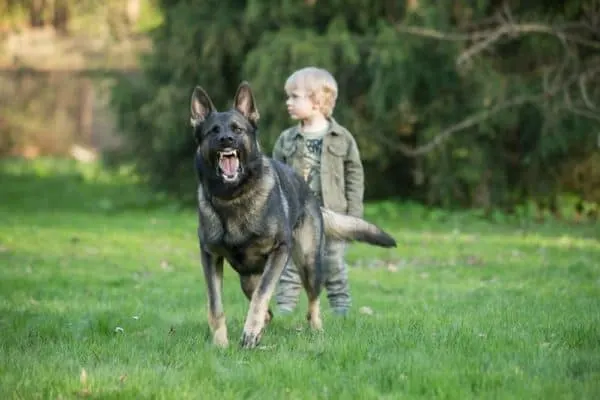
Incessant Barking, Even When You Say “No!”
German Shepherds are naturally protective and as such, are more likely to bark at movements, sounds, and animals than other breeds.
Unfortunately, this can turn into aggressive barking you can’t control.
A well-trained and well-behaved German Shepherd can learn to stop barking when you tell it to – if your dog continues barking after you tell it to stop, it can be a sign of aggression.
By barking after you’ve given a signal to stop, your German Shepherd is openly defying your authority as the pack leader.
He isn’t respecting you and he’s going against your command. This translates as aggression and can become a sign of more dangerous behavior.
Barking isn’t necessarily a sign of aggression by itself – in fact, many anxious dogs bark because they feel uneasy.
You can differentiate between anxious and aggressive barking by tone and volume. If your dog barks louder after you tell him to stop, he’s likely feeling confrontational.
Your Dog Chews Your Belongings and Furniture
Like barking, a well-behaved German Shepherd will stop chewing on something when you tell him not to.
He may mistake a shoe for a toy – after all, they are a curious breed – but he should respond when you ask him to leave it alone.
If he ignores your command, this is another act of defiance. He’s asserting his dominance with antagonistic behavior to act out.
Again – some dogs respond to commands better than others. Don’t be surprised if your German Shepherd is playing with your shoe because he thinks it’s a toy.
You can know if he’s being aggressive if he begins growling or barking when you give a ‘no’ command.
Highly aggressive dogs may snap at you if you try to take the belonging away from them so it’s important to resolve this behavior early.
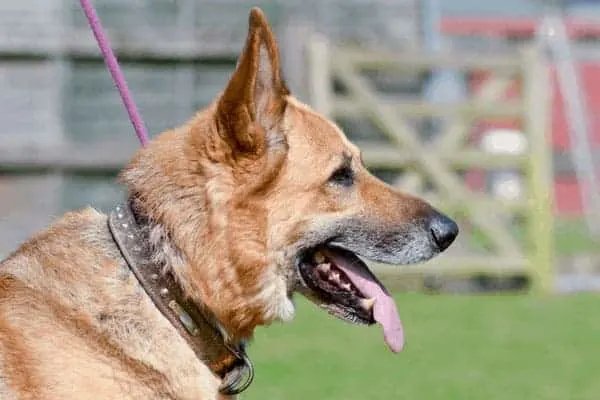
Your Dog Chases and Barks at Other Animals in the Home
Well-adjusted German Shepherds should act as protectors for you and other members of your family. They’re usually great with other dogs and cats, rarely causing issues with other pets in the home.
However, naturally aggressive German Shepherds are less likely to be accommodating. They may chase other animals and bark at them to intimidate them, establishing their dominance in the home.
These behaviors can be scary and may escalate to dangerous levels without proper training.
Don’t cast it off as playful behavior, either – aggression and playfulness are distinctly different and it’s important to distinguish between the two to avoid accidents and keep your furry friends safe.
Your Dog Growls or Nips at You When You Try to Touch Him
Your German Shepherd should never nip at your or growl when you try to touch him. This is a distinct sign of aggression and it may lead to more dangerous behavior in the future.
When your dog growls at you or nips when you try to touch him, he’s telling you that you’re a threat.
He doesn’t trust you and that’s not good for either of you – if your dog doesn’t trust you, it’ll be more challenging to train him.
If your dog nips and growls when you try to touch him, take him to training lessons as soon as possible. You don’t want this behavior to evolve into full-on biting, especially if your dog will be around children.
Your Dog Growls and Barks When You Have Food
It’s common for German Shepherds to “beg” when you’re eating – after all, your dinner smells great!
Drooling and laying near your feet while you eat is annoying, not aggressive. You can easily train a German Shepherd to leave you alone while you eat.
The issue starts when your dog barks and growls while you’re eating. Some may even lunge toward you, trying to grab your food before you take a bite.
This can be scary, especially the first time it happens. Food aggression is one of the most common hostile behaviors in German Shepherds and it can be challenging to address.
Before you fix the issue, it’s important to keep your dog away from other animals while they eat and seek professional help – you don’t want to hurt yourself doing this kind of training at home.

Are German Shepherds Aggressive? Every Situation is Different
German Shepherds are one of the most loyal dog breeds you can adopt. They’re protective and intelligent, making them exceptional guard dogs and family members.
On the other hand, they’re more naturally aggressive than other breeds. Because they’re bred to protect their families, they may act aggressively under certain circumstances.
Fortunately, German Shepherds are smart and it’s easy to teach them healthier behaviors. Oftentimes, their aggression is a sign of other factors at play, like boredom.
When you figure out why your German Shepherd is acting aggressively, you’ve figured out the first big step to helping it feel more secure and well-adjusted.
It’s important to understand that you can fix aggressive behaviors in most German Shepherds with enough time, patience, and dedication.
Best of all, you don’t have to do it alone. Do some research and look for German Shepherd trainers in your city.
They’ll know exactly how to teach your dog healthier behaviors, teach him to respect you as his leader, and mitigate dangerous aggression before it gets worse.
Additionally, training lessons can be a great place for your dog to socialize – he’ll learn alongside his classmates in group training sessions, giving him valuable time to work on his behavior.
Related Post: At What Age Will Your GSD Dog First Get Aggressive


















